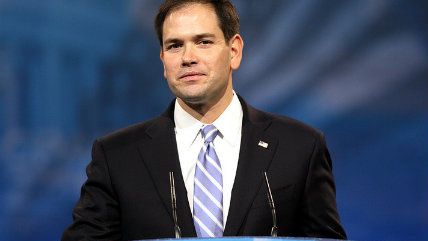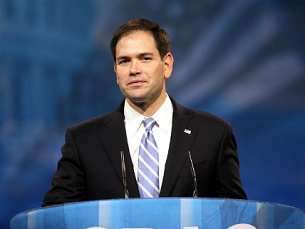America Would Be Richer and Safer If Europe Paid For Its Own Defense
Europe can afford to defend itself.


Earlier this year, at the South Carolina Republican debate, Sen. Marco Rubio rattled off a list of the three top threats he'd want to address as president.
First: North Korea. Second: ISIS. "And the third is rebuilding and reinvigorating NATO in the European theater," he said, "particularly in Central Europe and in Eastern Europe" as a counterbalance to Russian power.
The moderator didn't allow any of Rubio's competitors to respond to this trio, but had he been permitted to speak, Donald Trump may well have raised an objection to that third point. "Pulling back from Europe would save this country millions of dollars annually," he recently said. "The cost of stationing NATO troops in Europe is enormous. And these are clearly funds that can be put to better use."
Trump is hardly a foreign policy maven—ricocheting as he does between calls for restraint and open planning of war crimes—but on this point he gets it right: What Rubio is advocating is not so much defense as it is expanded subsidy of the European welfare state.
Indeed, NATO's European wing is notorious for its freeloading on American military might, a longstanding habit of bilking U.S. taxpayers for defense while throwing good money after bad on expansive social engineering projects.
Just how much NATO Europe is mooching off the U.S. is evident with just a quick glance at the numbers. Per capita, the United States drops close to $2,000 annually on the military. NATO Europe averages less than $500—with one country, Bulgaria, as low as $89.
The contrast is so significant that it actually sees our European friends in breach of the terms of our alliance: They spent less than 1.5 percent of GDP on defense last year, despite NATO's requirement of a 2 percent minimum. (America, by contrast, devotes an aggressive 4 to 5 percent of GDP to military spending.)
Meanwhile, as the Wall Street Journal editorialized, "Europe has built elaborate domestic income-maintenance programs, with government-run health care, pensions and jobless benefits. These are hugely expensive, requiring high taxes and government spending that is a huge proportion of GDP."
All of this is possible because, in the words of one Slovakian party leader, "we enjoy protection primarily from NATO"—which is to say, we let American taxpayers pick up the tab.
Rubio's plan is also a policy he shares with none other than President Obama, who recently announced his new budget will quadruple American military spending in Europe. Does Rubio find that massive subsidy expansion adequate—or does he plan to out-spend the biggest spender in White House history?
Either way, the course of action he advocates is due serious reevaluation by members of both parties, but particularly fiscal conservatives. Bankrolling Europe's defense is a financial and strategic risk, adding to our gargantuan budget deficits and national debt—itself a threat to national security—while making hot war with Russia more likely.
And NATO Europe has no incentive to make good on its defense spending commitment as long as it can so easily plunge a hand into America's deep pockets whenever there are rumblings from Russia. Though it is easy to understand the appeal of freeloading for Europeans, it is in their own interest for the bailouts to end.
Shifting responsibility for Europe's defense to Europe's own shoulders would increase the continent's security in the long run, but to maintain the current subsidies only makes American poorer and all of NATO less safe.
Rubio does get one thing right: It is time to rebuild and reinvigorate NATO in the European theater. And it's time for the Europeans themselves to do it.


Show Comments (48)